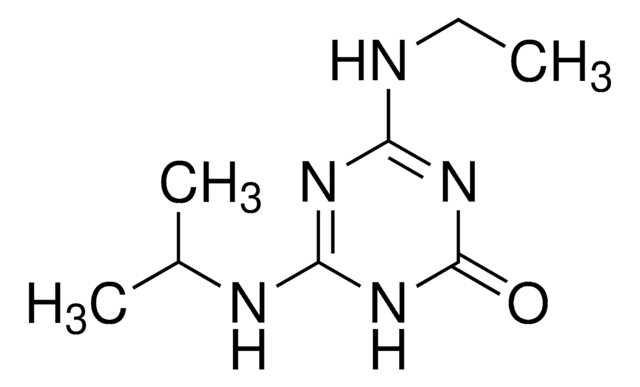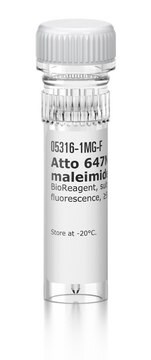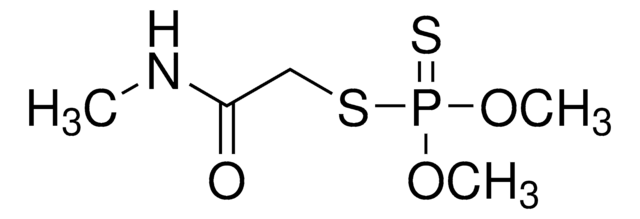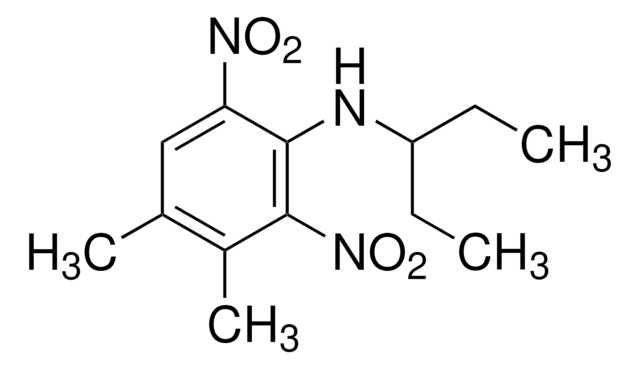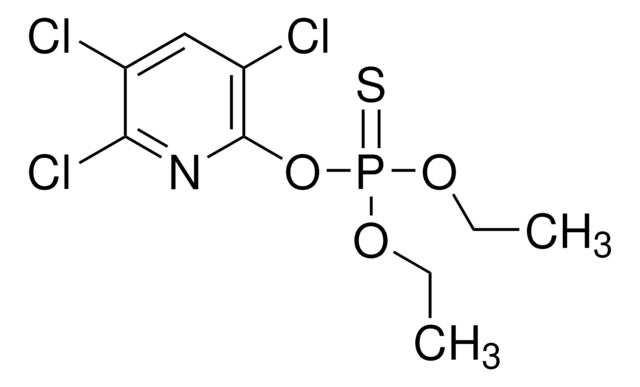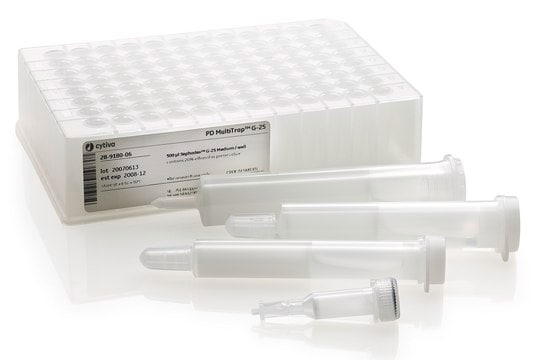41784
Atto 647 maleimide
BioReagent, suitable for fluorescence, ≥90% (coupling to thiols)
Autenticatiper visualizzare i prezzi riservati alla tua organizzazione & contrattuali
About This Item
Codice UNSPSC:
12352111
NACRES:
NA.32
Prodotti consigliati
Nome Commerciale
BioReagent
Livello qualitativo
Saggio
≥90% (coupling to thiols)
Stato
solid
Produttore/marchio commerciale
ATTO-TEC GmbH
Fluorescenza
λex 647 nm; λem 669 nm in 0.1 M phosphate pH 7.0
Compatibilità
suitable for fluorescence
Temperatura di conservazione
−20°C
Applicazioni
Atto 647 belongs to a new generation of fluorescent labels for the red spectral region with high molecular absorption (120.000) and quantum yield (0.20) as well as sufficient stoke′s shift (excitation maximum 645 nm, emission maximum 669 nm). Atto 647 is characterized by a high photostability. The dye is designed for application in the area of life science, e.g. labeling of DNA, RNA or proteins. Atto The dye is very stable under physiological pH-values and in buffers up to pH 8.5. However, it slowly degrades at higher pH. Atto 647 maleimide shows excellent solubility in polar solvents like DMF, DMSO or acetonitrile. After coupling to a substrate the dye moiety is electrically neutral.
Note legali
This product is for Research use only. In case of intended commercialization, please contact the IP-holder (ATTO-TEC GmbH, Germany) for licensing.
Non trovi il prodotto giusto?
Prova il nostro Motore di ricerca dei prodotti.
Codice della classe di stoccaggio
11 - Combustible Solids
Classe di pericolosità dell'acqua (WGK)
WGK 3
Punto d’infiammabilità (°F)
Not applicable
Punto d’infiammabilità (°C)
Not applicable
Dispositivi di protezione individuale
Eyeshields, Gloves, type N95 (US)
Scegli una delle versioni più recenti:
Possiedi già questo prodotto?
I documenti relativi ai prodotti acquistati recentemente sono disponibili nell’Archivio dei documenti.
I clienti hanno visto anche
Andreas Bruckbauer et al.
Biophysical journal, 93(9), 3120-3131 (2007-07-17)
We have developed a new method, using a nanopipette, for controlled voltage-driven delivery of individual fluorescently labeled probe molecules to the plasma membrane which we used for single-molecule fluorescence tracking (SMT). The advantages of the method are 1), application of
Jean-Manuel Segura et al.
The Journal of biological chemistry, 283(35), 24254-24263 (2008-06-27)
CD8(+) cytotoxic T lymphocytes (CTL) can recognize and kill target cells expressing only a few cognate major histocompatibility complex (MHC) I-peptide complexes. This high sensitivity requires efficient scanning of a vast number of highly diverse MHC I-peptide complexes by the
Nicole Marmé et al.
Bioconjugate chemistry, 14(6), 1133-1139 (2003-11-20)
Steady-state and time-resolved fluorescence measurements were performed to elucidate the fluorescence quenching of oxazine, rhodamine, carbocyanine, and bora-diaza-indacene dyes by amino acids. Among the natural amino acids, tryptophan exhibits the most pronounced quenching efficiency. Especially, the red-absorbing dyes ATTO 655
Daniel Puntener et al.
Journal of virology, 85(1), 481-496 (2010-11-05)
Human adenoviruses (Ads) replicate and assemble particles in the nucleus. They organize a linear double-strand DNA genome into a condensed core with about 180 nucleosomes, by the viral proteins VII (pVII), pX, and pV attaching the DNA to the capsid.
Thorben Cordes et al.
Physical chemistry chemical physics : PCCP, 13(14), 6699-6709 (2011-02-12)
Modern fluorescence microscopy applications go along with increasing demands for the employed fluorescent dyes. In this work, we compared antifading formulae utilizing a recently developed reducing and oxidizing system (ROXS) with commercial antifading agents. To systematically test fluorophore performance in
Il team dei nostri ricercatori vanta grande esperienza in tutte le aree della ricerca quali Life Science, scienza dei materiali, sintesi chimica, cromatografia, discipline analitiche, ecc..
Contatta l'Assistenza Tecnica.